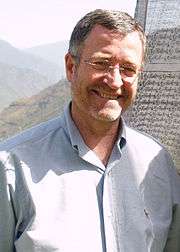Gary Sturgess

Gary L. Sturgess, AM is an Adjunct Professor with the Australia and New Zealand School of Government (ANZSOG), based in Sydney, Australia, holding the New South Wales Premier's ANZSOG Chair in Public Service Delivery at the Australian School of Business, University of New South Wales.[1] He is also a Professor of Public Service Innovation with the School of Government and International Relations at Griffith University,[2] in Brisbane, Australia, and the School of Government at Victoria University of Wellington, New Zealand.
From 2003 to 2011, he was Executive Director of the Serco Institute, a London-based think tank specialising in the design and management of public service markets. He was previously Cabinet Secretary in New South Wales, Australia, under Premier Nick Greiner, during which time he introduced a number of major policy initiatives including the Independent Commission Against Corruption (ICAC).[2]
Early years
Sturgess grew up in Dalby, Queensland, a small town approximately three hours inland from Brisbane, the second of four sons of Lindsay and Joy Sturgess. He was educated at local state schools, and graduated in law from the University of Queensland.
Career
He commenced his professional career in Brisbane working as an investment analyst for one of Australia's largest mining companies, MIM Holdings Ltd. In 1980 he moved to Sydney to become the legal correspondent for the Australian news magazine, The Bulletin.
In 1982, he was recruited by Jim Carlton, recently appointed as Federal Minister for Health, to serve as his private secretary. Following the fall of the Fraser Government in March 1983, he joined the staff of the newly elected Leader of the New South Wales Opposition, Nick Greiner, as the Director of Research and Policy Development. In addition to policy development, he directed extensive research into official corruption in the then NSW Government, contributing to a number of public inquiries and criminal prosecutions, and leading the then Leader of the Opposition Bob Carr, to refer to him as 'Lord of the Files'.
Upon the change of government in March 1988, he was appointed as Director-General of the NSW Cabinet Office in the Liberal-National Coalition Government led by Premier Nick Greiner. In the five years he served as Cabinet Secretary, Sturgess personally drove a number of policy initiatives, including the establishment of the Independent Commission Against Corruption,[3] the corporatisation of government business enterprises, the so-called 'new environmentalism' (including tradeable air, water and fishing permits), and the creation of electricity markets.
From 1990, he was involved in the 'new federalism' agenda, initiated by Prime Minister Bob Hawke and Premier Greiner. He led NSW officials in a series of Special Premiers Conferences that produced new policies such as the National Competition Policy, the National Electricity Market, mutual recognition of state regulations and ultimately, the Council of Australian Governments.
He retired from public administration in late 1992 following the resignation of Greiner as Premier. From 1993 to 2000, Sturgess chaired a series of government inquiries into business regulation, the governance of the Great Barrier Reef Marine Park Authority, the financial management of the Australian Federal Police and the rationalisation of Australia's border controls, among other issues.
He also served on a number of public, private and not-for-profit boards, including the Australian Constitutional Centenary Foundation, the NSW Police Board and spent seven years as a non-executive director of the Serco Group PLC, a FTSE-100 public service company operating in Europe, North America and Asia-Pacific.
In 2000, Sturgess relocated to London, where he joined Serco as Adviser to the Board and then from January 2003, as Executive Director of the Serco Institute, whose purpose is "to foster the development of sustainable public service markets through an outward-facing programme of research and communication".
He resigned from the Serco Institute in April 2011 and returned to Australia to take up the New South Wales Premier's ANZSOG Chair in Public Service Delivery at the University of New South Wales, a research position based in the government precinct in Sydney and studying the challenges involved in front-line service delivery. In 2014, he was also appointed as Professor of Public Service Innovation at Griffith University in Brisbane, Australia.
Honours
Sturgess was awarded membership of the Order of Australia in January 2005, for services to government.[4]
Personal
He remains involved as a director of his late father's business, Engine Australia, an Australian after-market diesel engine parts supplier. He married his wife Helen in Brisbane in 1976, and they are the parents of four children.
In his spare time, Sturgess is writing a history of early Australian convict transportation, exploring the role played by convict contractors and the ships' crews in managing the prisoners, and the involvement of these merchant ships in trade with Asia.
References
- ↑ "Professor Gary Sturgess". Australia and New Zealand School of Government. Retrieved 10 May 2013.
- 1 2 "Gary Sturgess – Biography". Griffith University. Retrieved 10 May 2013.
- ↑ Thomson, Phillip (9 April 2014). "Public service a 'disappearing art', says former mandarin Gary Sturgess". The Canberra Times. Fairfax Media. Archived from the original on 9 April 2014.
- ↑ "A question of funding". Brisbane Times. 3 March 2012.